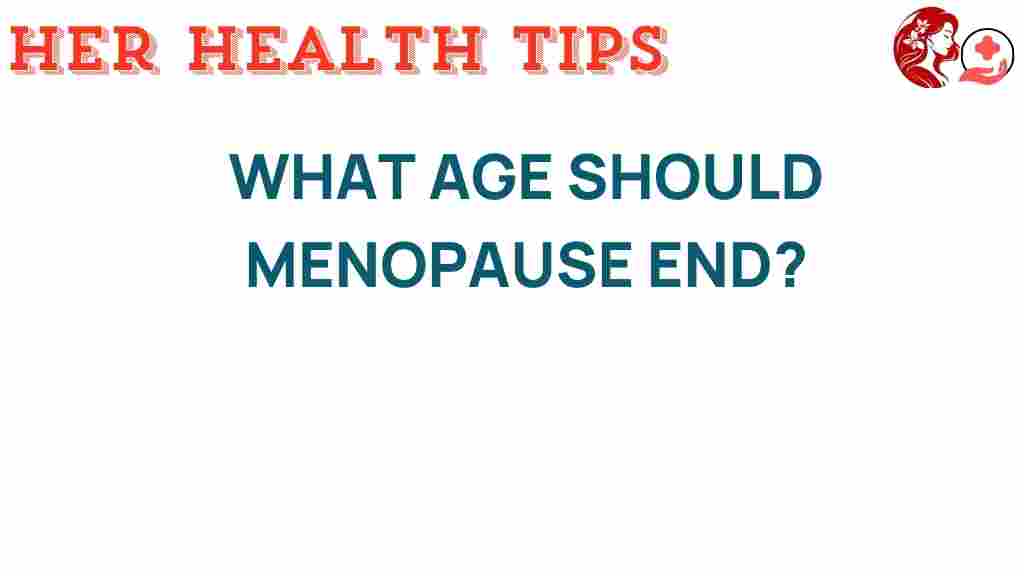The Unanswered Question: What Age Should Menopause Truly End?
Menopause is a natural stage in every woman’s life, marking the end of her reproductive years. It signifies a significant transition in women’s health, characterized by hormonal changes that can affect various aspects of life. Understanding when menopause should truly end is not just about age; it’s about recognizing the broader context of women’s health, aging, and wellness. In this article, we will explore the age at which menopause typically occurs, the factors influencing this age, and the implications for women’s reproductive health.
Understanding Menopause and Its Life Stages
Menopause is defined as the time in a woman’s life when her menstrual cycles cease, signaling the end of fertility. This transition usually occurs between the ages of 45 and 55, with the average age being 51. However, the onset and duration can vary widely among individuals. Let’s break down the stages of menopause:
- Perimenopause: This is the transitional phase leading up to menopause, which can begin several years before the last menstrual period. During this time, women may experience irregular periods and various symptoms due to fluctuating hormone levels.
- Menopause: Officially diagnosed after 12 consecutive months without a menstrual period. Hormonal changes during this phase can lead to symptoms such as hot flashes, night sweats, and mood changes.
- Postmenopause: This stage follows menopause and lasts for the rest of a woman’s life. Though some symptoms may ease, others can persist, and new health challenges may arise.
Factors Influencing the Age of Menopause
The age at which menopause occurs can be influenced by several factors, including:
- Genetics: Family history plays a crucial role. If a woman’s mother or sisters experienced early menopause, she may too.
- Health Conditions: Certain medical conditions, such as autoimmune diseases or thyroid disorders, can impact hormonal changes and reproductive health.
- Lifestyle Choices: Factors like smoking, diet, and exercise can influence the timing of menopause. Studies show that smokers tend to experience menopause earlier than non-smokers.
- Surgical Interventions: Women who undergo hysterectomies or have their ovaries removed may enter menopause prematurely.
How Menopause Affects Women’s Health
The transition into menopause is not just a matter of reproductive health; it encompasses various aspects of women’s wellness. Hormonal changes during this life stage can lead to a range of physical and emotional symptoms:
- Physical Symptoms: These include hot flashes, sleep disturbances, and changes in weight distribution.
- Emotional Symptoms: Mood swings, anxiety, and depression can arise due to hormonal fluctuations.
- Long-term Health Risks: Postmenopausal women may face increased risks of osteoporosis, cardiovascular diseases, and certain cancers.
Understanding the Age of Menopause: Is It Fixed?
While the average age of menopause is around 51, it is essential to recognize that this is not a fixed point. The end of menopause can vary significantly among women. Factors contributing to the variability include:
- Cultural Factors: In some cultures, women may experience menopause at different ages due to lifestyle and dietary practices.
- Environmental Influences: Exposure to certain chemicals and pollutants can impact hormonal health and may influence the age of menopause.
- Medical Advances: Improved healthcare and lifestyle changes can affect the timing and experience of menopause.
Transitioning through menopause can be challenging, but understanding the process can empower women to manage their health effectively. Here’s a step-by-step guide:
- Recognize Symptoms: Be aware of common symptoms associated with perimenopause and menopause.
- Consult a Healthcare Provider: Schedule regular check-ups to discuss symptoms, receive guidance, and explore treatment options.
- Consider Lifestyle Changes: Adopt a balanced diet, engage in regular physical activity, and practice stress-reducing techniques like yoga or meditation.
- Explore Treatment Options: Discuss hormonal or non-hormonal therapies with your doctor to alleviate severe symptoms.
- Stay Informed: Keep abreast of the latest research and recommendations regarding menopause and women’s health.
Troubleshooting Common Menopause Symptoms
While menopause is a natural process, it can lead to uncomfortable symptoms. Here are some troubleshooting tips:
- Hot Flashes: Dress in layers, keep a fan nearby, and stay hydrated.
- Sleep Issues: Establish a bedtime routine, limit caffeine and alcohol, and create a comfortable sleep environment.
- Mood Swings: Practice mindfulness, engage in physical activity, and seek support from friends or professionals.
Emphasizing Wellness and Reproductive Health Post-Menopause
Postmenopause is a time for women to focus on their overall wellness and reproductive health. Here are some key areas to concentrate on:
- Bone Health: Incorporate calcium and vitamin D into your diet and engage in weight-bearing exercises to strengthen bones.
- Heart Health: Monitor blood pressure and cholesterol levels, maintain a healthy weight, and stay active to reduce heart disease risk.
- Mental Health: Stay socially active, engage in hobbies, and consider therapy if experiencing anxiety or depression.
Conclusion: Embracing the Transition
Menopause is a significant life stage that marks the end of fertility and brings various hormonal changes. While the average age of menopause is around 51, it can vary widely due to numerous factors including genetics, lifestyle, and health conditions. Understanding the implications of menopause on women’s health is crucial for navigating this transition successfully.
Women should feel empowered to seek information, consult healthcare providers, and adopt lifestyle changes that promote wellness during and after menopause. As we embrace aging, it is essential to prioritize reproductive health and overall well-being. For more information on women’s health topics, visit WomensHealth.gov.
Each woman’s experience with menopause is unique, and addressing the unanswered questions surrounding this transition can lead to a healthier, more fulfilling life in the years to come.
This article is in the category Reproductive and created by HerHealthTips Team
